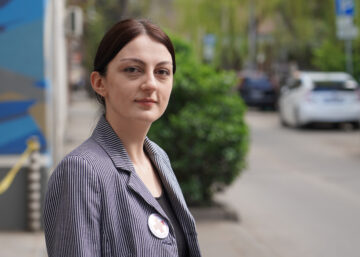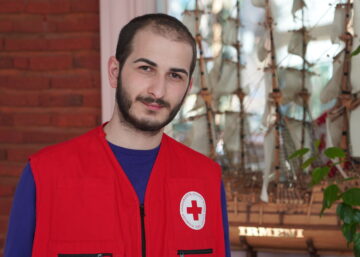“As soon as the pandemic was declared, everyone got isolated; The only message we heard was: Stay Home! Isolate yourself! Do not meet people! At the same time our duty was not to stay at home; we met as many people as possible and offered our support to them. In fact we were moving against the flow. Unbelievable, but I stayed COVID-free during all this stressful and dangerous period. I think the reason for this was the strictly followed recommendations; Psycho-emotional resilience and the devotion of my job.”
Georgia Red Cross Society – Home Care Program
I have been working with the Georgia Red Cross for 8 years now. I started as a volunteer and now I help homeless elderly people.
The Georgian Red Cross Home Care Program is one of the essential initiatives to support and care for the most vulnerable segments of our society. Every day lots of people contact the city hall to register and get into our program. The city hall itself provides us with the lists of beneficiaries.
After getting the list, the Red Cross doctors and social workers visit the beneficiaries to assess their health condition and to determine how many visits per week should be planned. They also assess what kind of help can be provided – medicines, hygiene, care products, etc. After that a plan is made and the Red Cross nurses are directly involved in the process.
The Pandemic
Indeed, the COVID-19 pandemic represents a great challenge to the whole world, but most of all it has made life difficult for our beneficiaries. For them, in the circumstances of the pandemic, everyday life became unbearable.
In terms of social distancing, abandoned elderly people were completely excluded from society. Fully equipped Red Cross nurses in this situation were the only salvation and relief for them. They were not afraid of getting infected during our visit (constant tests and strict adherence to the recommendations guaranteed this) and at the same time, we helped them as much as possible with their medical issues or daily worries.
I am pleased to note that most of my patients – elderly with chronic diseases – have survived COVID-19. But those who got infected also suffered post-COVID symptoms, mostly intensified with psycho-emotional complications. My colleagues and I had to manage these symptoms. And it was really stressful.
During this period, personally, I did not think about myself. I felt the greatest responsibility towards my family members and towards my patients – the elderly with whom communication was my daily routine. I realized that an infection transmitted from me to them could be fatal. And that caused me big psychological pressure.
The good thing is that I survived! I avoided an infection even during the most difficult epidemiological situation in the country. This is probably due to the fact that I followed all the recommendations carefully and at the same time I did not allow myself to panic. I kept telling myself: Now is not the time to be sick. I care about peoples’ health, their well-being and, literally, their lives.
During this period my patients called me very often to check if I was fine. They reminded me that I was their only hope. These calls gave me incredible strength.
What if there was no Psychological Support…
I should mention that all this time I have been using the support of Red Cross psychologists. It is thanks to them that I survived the COVID pandemic and was able to more or less protect my mental health during this extremely stressful and difficult period.
Red Cross sessions with psychologists for nurses were available several days a week. A professional approach, honest conversations, and an analysis of my fears and anxieties personally helped me a lot. That is why I always consider these sessions an excellent opportunity.


